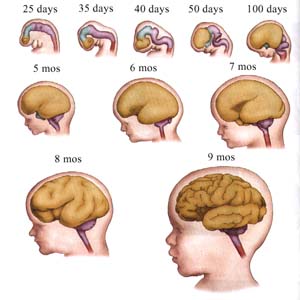THE BRAIN DEVELOPMENT
The first three years of life are a period of incredible
growth in all areas of a baby’s. By age 2, the brain is almost 75 percent of
adult brain weight, the brain communication system begins with nerve cells
called neurons.
During the first months and years, rapid growth and refinement in axons, dendrites and synapses ocour, especially in the cortex for 4 months infants are able to her and listen.
The infant brain development depends on sensory experiences and early movements, every sense functions at birth : they listen, smell, taste, and touch.
Hearing : develops the last trimester of pregnancy (infants turns their heads toward the source of a sound).Seeing: vision is the least mature sense at birth, newborns focus objects between 4 and 30 inches. Smelling: tasting, and touching.
From the first moments of life infants show a preference for human faces and voices and can even imitate adult facial expressions ”emotion sharing” infants experience the quality of their relationships whit others that will has a tremendous impact on how development unfolds.

http://www.zerotothree.org/child-development/brain-development/baby-brain-map.html
·
COGNITION
AND LEARNING
The importance of talking, reading,
and interacting with their toodlers to support development in all brain areas: motor,
cognitive, social, emotional and language.Nurturing relationships and the daily interactions around care giving and free play that exercise a toddler’s brain,
Provide play experiences that allow toddlers to problem solve converse, develop self care skills, engage in gross and fine motor activities, Interact with peers.
·
LANGUAGE
Young children’s brain are very open to the sounds and language patterns, Toodler are indeed capable of learning to languages, they begin life with the ability to hear the differences among the sounds of many languages.
A key requirement for learning language is that it occurs in the context of a nurturing relationship.
Music, sing, dance, promote healthy emotional, social, physical, motor, cognitive, and language development, and offer positives experiences for brain development.
·
MOVEMENT
From 2-3 years is importance that todders practice some skills like: jumping, hopping, climbing ,zipping ,manipulating puzzles pieces, buttoning, using spoon and fork.
As toddlers practice this skills, their movement reinforces the growth of brain cells and the developing connections between them. You can foster toodlers motor development by providing lots of space, and opportunity for them to engage in fine and gross motor activities, doing this you are supporting the developing of this skills and also the brain development.








